Public Launch 2010
EGO Launch Programme
Please click here for a PDF file of the programme of the EGO launch
Film Excerpts of the Live Video Conference
Gernot Wilhelm: Opening Address
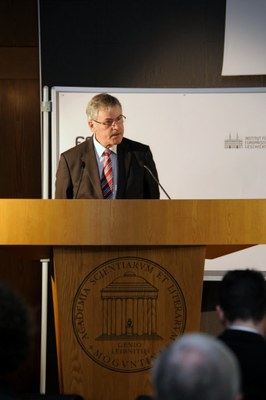
Professor Gernot Wilhelm, Vice-President of the Academy of Sciences and Literature, Mainz
A very warm welcome, also on behalf of the president Professor Lütjen-Drecoll – to the Akademie der Wissenschaften und der Literatur (Academy of Sciences and Literature), Mainz.
I am very happy to be able to greet you in the plenary hall of our academy to celebrate the launch of Europäische Geschichte Online (European History Online). I am especially pleased that the launch is taking place in our rooms, as it demonstrates the close working relationship and community of interest that exists between the Institute of European History (IEG) and the Mainz Academy. The close nature of our association is made clear by the fact that the two directors of the institute, Professor Dingel and Professor Duchhardt, are members of our academy. Far from being merely the product of personnel overlap, the relationship between our two institutions is based on shared aims and close co-operation. Both the academy and the Institute of European History conduct intensive research of a long-term nature which could not be pursued in a university environment.
Our academy currently supervises some 40 long-term projects funded by the federal and state academy programme. These include a number of projects focussing on European history. Just some examples: the project investigating German inscriptions and the project on Regesta imperii; both projects involving several academies. Further undertakings include works to establish a collection of sources on German social policy between 1867–1914, and the body of sources relating to Medieval Judasim. Last but not least, the project Controversia et Confessio, an edition of sources regarding confessionalization between 1548–1580, also integrated in the academy programme, was originated and is led by Professor Dingel herself.
Indeed, the nature of our good working relationship is embedded in the IEG constitution, which commends "co-operation with other institutions pursuing similar aims in both Germany and abroad". This constitution even explicitly mentions the Akademie der Wissenschaften und der Literatur in Mainz.
Our two institutions are also more than happy to co-operate in other areas such as the organization of conferences and podium discussions. The launch of Europäische Geschichte Online is a particularly good example of such a joint undertaking.
I am happy to be able to continue this record of good partnership; and I offer you my best wishes for a successful launch of Europäische Geschichte Online, a website, which, I hope, will be appreciated by many users for a long time to come.
Michael Ebling: Welcome
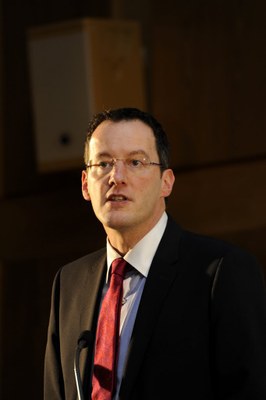
State Secretary in the Ministry of Education, Science, Continuing Education and Culture, Rhineland-Palatinate
Many thanks for your invitation to this event here in Mainz which I was only too pleased to accept. I should also like to pass on best wishes from the Minister of State Doris Ahnen, who is unfortunately unable to attend herself due to other engagements.
The Institute of European History (IEG) has received much favourable press coverage of late:
- The IEG is celebrating its 60th birthday this year
- Today, the public launch of Europäische Geschichte Online (European History Online) is taking place.
- Recently the German Council of Science and Humanities (Wissenschaftsrat) recommended the IEG become a member of the prestigious Gottfried Wilhelm Leibniz Scientific Community (Leibniz-Gemeinschaft).
Let me start by congratulating the IEG on the occasion of its 60th birthday. Founded in 1950 following a French initiative, it has since developed splendidly.
To me, one of the most impressive aspects of the 60 year history of the IEG is the fact that the research tasks formulated in its founding statue – now 60 years old – are still relevant today. This statute stipulates research into the European religious and intellectual tradition, its changes and crises, ecclesiastical splits, the possibility of their reconciliation, an above all, the question as to our common European identity and the potential for European integration. This task has been fulfilled exceptionally well in the past 60 years. With its newest project, Europäische Geschichte Online (EGO) the institute has opened a new and exciting chapter in its history. My congratulations.
With its project Europäische Geschichte Online realized in co-operation with the University of Trier, the IEG demonstrates the innovative role which the internet can play within the humanities. Following the consistent use of the internet as a platform for the development and establishment of innovative, practical forms of presentation, the historical research into European history has taken a further step on the road towards international integration. Ideally, it combines the efforts of all historically interested scholars currently working on the European question. Moreover, Europäische Geschiche Online guarantees that the coming academic generation is integrated in this very prestigious scholarly project, by including many young scholars in the authorial team.
Working on the basis of this new European website, the project attempts to bundle the various approaches to European history currently found in the historical profession, with the aim of producing a pan-European approach towards a pan-European perspective. The not unambitious aim of this thoroughly innovative approach is to facilitate communication between the various national and regional approaches to modern European history and through the use of new multimedia applications to create a consistent analytical European historical narrative covering the last 500 years. I am very much looking forward to the results of the next years.
For me, the project Europäische Geschichte Online is proof that the investment made within the scope of the university funding programme "Wissen schafft Zukunft" has proven to be exceptionally good value for money, with every cent of the start-up funding (amounting to 114,500 € between 2007–2008) having been invested well. It was this initial success which convinced the Deutsche Forschungsgemeinschaft (German Research Foundation) to fund the following project phase. I am very much looking forward to learning more about the project in the following presentation, especially how the results of cross-border research are being presented.
The lasting significance of the project EGO soon becomes clear in the appraisal of the project by the German Council of Science and Humanities where it says: "The interdisciplinary nature of the concept combines … scholars in an entirely convincing fashion. ... EGO promises to bear considerable and valuable fruit."
This brings me to the third favourable headline featuring the IEG; the recommendation by the Council of Science and Humanities for the admission of the IEG to the Leibniz Scientific Community and its joint federal/state funding. Again, congratulations! I cannot imagine a more suitable present to mark a 60th birthday.
The recommendation of the Council of Science and Humanities shows just how far and well the institute has developed. In issuing its recommendation from Nov. 12th 2010, the Council emphasized that the activities of the IEG were not only of supra-regional significance, but of nation-wide academic interest. Moreover, as the Council added, its tasks – especially the compilation of long-term editions – were such that they could not be performed by a university. The Council also made clear that the IEG had established a unique position within the German and international historical academic scene. What is more, these words of praise were made not only unanimously, but coupled with the recommendation that the IEG be admitted to the Leibniz Scientific Community and its joint federal/state funding.
I would also like to name the other exemplary points highlighted by the Council of Science and Humanities:
- A very positive assessment of the intensive level of conceptional and theoretical discussions in the four Areas of programme bound research of the IEG, which have led to innovative results in a number of areas.
- Special mention was made of the Deutsche Forschungsgemeinschaft graduate colloquium (in Research Area I) run jointly with the University of Mainz.
- The Council also issued fulsome praise for the development exhibited by the Research Area "Communication and Transformation in Religion and Society", Research Area "Spatially-oriented Research into European History since 1500" and also the Cross Section Europäische Geschichte Online.
- Furthermore, the Council praised the agreement made between the University of Mainz and the IEG establishing an "Agreement to Perform Joint Appointments within the Framework of Academic Co-operation."
The Council thought worthy of mention was also the remarkable level of financial involvement on the part of the state government (state funding of the IEG was raised from 1.5 million Euros to approx 1.96 million Euros between 2007–2011).
All this makes clear that the consistent funding and support provided to the IEG was the right thing to do. Bringing together theologians and historians within a joint undertaking is a unique feature within the academic world and is something which has now found adequate recognition.
Such successes are always the successes of people. Thus, I should like to express my special thanks to the two institute directors, Professor Dingel and Professor Duchhardt. I should also like to express my thanks to all the employees of the Institute of European History, represented today by the research coordinator, Dr Berger.
Marianne Grosse: Welcome
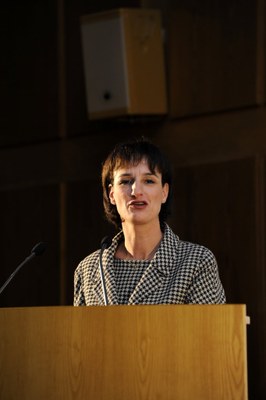
Head of the Department of Culture of the City of Mainz
As we have just heard, we have every reason to celebrate today in several respects. I have therefore come with particular pleasure to the Academy of Sciences and Literature to this European event of the public launch of Europäische Geschichte Online (EGO) in order to convey to you the greetings and congratulations of the City of Mainz on the launch of the website.
At the same time I congratulate the Institute of European History (IEG) very warmly on its "round birthday"! The Institute of European History is 60 years old. And for 60 years this nationally and internationally highly renowned institution has been closely linked with the name of our city.
The IEG is a great enrichment for us as a city of culture and science, which has its firm place in European history and is active to the present day in many and diverse European networks.
We are proud of the outstanding reputation and great capability of this institution rich in tradition which makes our city more open, more international with its scholarship programme, and in like manner acts as an advertisement as well as a catalyst for innovation for the academic location Mainz.
This has been underlined very recently by the unanimous recommendation of the German Council of Science and Humanities (Wissenschaftsrat) to admit the Institute to the Leibniz Scientific Community (Leibniz-Gemeinschaft). We were as delighted as you about this.
In addition, we are pleased that you have succeeded – also right on time for your 60th birthday – in presenting a new project with European History Online, which through its interdisciplinary character treats the history of Europe in a unique manner from the point of view of communication and transfer. Also and particularly through its multimediality, which promotes precisely this communication and transfer, the project – which will undoubtedly receive international attention – is emphasising important points.
Our year as "City of Science" has not yet begun. But as you know – you as Institute of European History are, of course, also involved – we are precisely in the "hot phase" shortly before the start. And here these impulses, emanating from your Institute, are extremely welcome.
Because you are making it clear already now how innovatively and at what a high level our academic institutions work. And that has, of course, an effect, inwardly and outwardly.
On the one hand, it strengthens the renown of the academic location and draws attention once again to the "City of Science 2011". And it makes the people of Mainz curious to explore their academic landscape intensively and to discover it anew.
As we know, science and the humanities do not take place in an area free of society. It is therefore all the more to be welcomed that the opening of science and the humanities and their deliberate positioning in a living civic society has been pushed ahead more and more in the past few years.
The Institute of European History has also taken part in this good development and Mainz lets the people of the city participate in its academic work.
I would mention here just briefly your "Open house" or your series of lectures, among others also two years ago in the City Hall. Last but not least the Institute – as I already mentioned just briefly – is also contributing to the Mainz Scientific Alliance and is becoming actively involved in the "City of Science". I am already eager to see the "Virtual Rhine Journey around 1850" conceived by you within the scope of the project "ZEIT.Fenster – Vergangenheit hat Zukunft" ["TIME.Window – The past has a future"] – a very attractive idea, which will quite certainly be very well received by the people of Mainz.
I would like to thank you very much indeed for this commitment to our city and wish the Institute of European History and all those who are connected with it continued great success and all the best.
Heinz Duchhardt: Acknowledgements
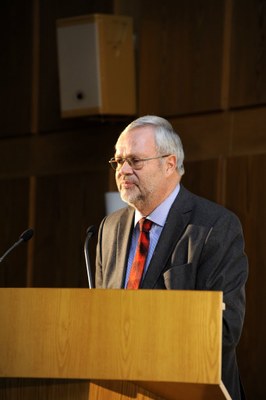
Director of the Institute of European History, Section Universalgeschichte
The Institute of European History (IEG) celebrated its 60th anniversary in 2010. A pivotal date in its long history was that of 12 November 2010, the day on which the German Council of Science and Humanities (Wissenschaftsrat) suggested that the IEG should become a member of the Gottfried Wilhelm Leibniz Scientific Community (Leibniz-Gemeinschaft), the select circle of extra-university research institutes in Germany of national importance.
As we have not yet celebrated this jubilee, what better occasion than now – the launch of Europäische Geschichte Online (EGO) – a project which the Council of Science and Humanities called "exceptionally positive".
EGO is the best illustration of the IEG`s conception as an interdisciplinary European research institute which gives an academic home to both theologians and historians. Indeed, the completion of EGO, our newest project, takes us back to the origins of our institute, which was born out of a number of discussions held at the Speyer historians' conferences of the late 1940s, centering on the need for a new, comprehensive "European history book". To be compiled by an international team of interdisciplinary scholars, this was intended to serve as the basis of a "revision" of the national school and university text books. Aiming to remove the "poison" of nationalist and confessional stereotypes from the classroom and university, it was seen that the ambitious nature of this undertaking would require an institutional basis.
Soon after its foundation in 1950, the IEG was commissioned with producing this "European history book" but for a number of reasons, this task was postponed and the IEG concentrated on awarding international scholarships and organizing conferences. Joseph Lortz and Martin Göhring, the founding directors, soon realized that the task of authoring a synthesis of a thousand (or indeed, "only" five hundred) years of European history represented an impossible assignment for one person. The institute thus passed on the task of schoolbook revision and the conception of a "European history book" to the newly-founded Georg Eckert Institute for International Textbook Research in Braunschweig (Georg-Eckert-Institut für internationale Schulbuchforschung).
The contemporary scholarly understanding of European history differs greatly from that of the 1950s and current research into the European question is much better able to control and deal with identity-forming conceptions of history such as the Abendland euphoria of the 1950s. Researchers have long realized that such views are reflective more of what the author wishes to see than what is actually to be found. The form of academic research has also changed, with greater emphasis being placed on international projects, the results of which are now published using the additional possibilities of the new media.
Having identified the opportunities provided by these new developments, the Institute of European History developed since 2004 the idea of an online "transcultural" history of Europe. Armed with these new concepts and methods, we are now able to complete the task set in the 1950s in a modern way.
Professor Dingel will introduce the scholarly agenda of EGO in the following address.
The work required to enable the launch of this project with a stock of 109 articles (including translations) could never have been undertaken without much support and we owe a debt of gratitude to a number of bodies and people:
- The Bundesland Rhineland-Palatinate for having funded our institute over half a century and especially for the comprehensive financial support granted the project Europäische Geschichte Online within the scope of their university programme "Wissen schafft Zukunft".
- The Deutsche Forschungsgemeinschaft (German Research Foundation) for the funding granted to EGO during its project phase, provided within the scope of its programme Wissenschaftliche Literaturversorgungs- und Informationssysteme
- The Bavarian State Library, which provided support in questions of long-term archiving
- Our international authorial team for their contributions as well as for their openness to new forms of publication.
- Our international, interdisciplinary editorial board who in addition to their wide-ranging tasks, found the time both to suggest many authors and to review their contributions. The editorial and authorial teams are the guarantee of the academic quality and constancy of Europäische Geschichte Online.
- The countless libraries, museums and other institutions throughout the world, which provided picture, audio and film material, often at reduced rates or free of charge.
- Our international co-operation partners. A number of these have joined us today via video link, including colleagues from Paris, London, Leuven, Budapest, Prague, Tartu, Zurich and Vienna. Their contribution to EGO and their participation in this event have made this launch an event of European significance – many thanks.
- The Academy of Sciences and Literature and its executive committee for today's event and the IT department at the University of Mainz, especially its manager Klaus Merle, for their material, logistical and conceptional support. We also owe a debt of gratitude to the City of Mainz (in the form of the Head of the Department of Culture Marianne Grosse) and her project "City of Science 2011" (Stadt der Wissenschaft 2011).
- We would also like to extend our thanks to our co-operation partner, the Trier-based Kompetenzzentrum für elektronische Erschließungs- und Publikationsverfahren in den Geisteswissenschaften (Center for Digital Humanities) and its director, Claudine Moulin. The organisational feat effected over the last months and weeks by those in the team of Thomas Burch, Patrick Heck and Florian Eckstein was exceptional.
Finally, EGO would never have come into being without our team at the Mainz Institute of European History; nearly all colleagues played some part in the project. My special thanks go to the editorial team (Lisa Landes and Jennifer Willenberg) and the project co-ordinators Ines Grund and Joachim Berger.
Irene Dingel: Introduction to "EGO | European History Online"
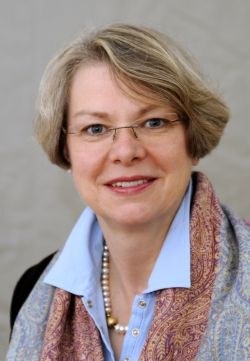
Director of the Institute of European History, Section Abendländische Religionsgeschichte
Europäische Geschichte Online or EGO for short is a modular, multi-media modern history of Europe focused on issues of communication and transfer.
During a four-year project phase set for completion in 2013, we plan to publish a total of 200 articles dealing with the processes of European communication and transfer. This open access project is funded by the Deutsche Forschungsgemeinschaft (German Research Foundation). Today we launch our website with 109 articles (including translations) – which are from now on freely accessible to the public.
EGO is primarily aimed at an international audience with a university education made up of advanced undergraduates, postgraduate students and experienced researchers from all the historical disciplines, as well as persons in journalism, publishing, schools and adult education in short, a cross-disciplinary audience, but primarily with an academic background.
Our project is not aimed at providing a "canon of knowledge" of European history suitable for an undergraduate audience, but rather seeks to incorporate the results of research which has been undertaken with a specific and defined research perspective in mind. This is why EGO is not just a new form of text book, encyclopaedia, or portal. We seek to add a new and under-represented perspective to the already existing histories of Europe.
Europäische Geschichte Online conceives of Europe as a dynamic arena of communication, the borders, centres and peripheries of which have been and are subject to the influence of contexts of time and topic. The decision to adopt this concept means that we also seek to avoid representing Europe as the sum of a number of national histories or even depicting it as the result of a number of pan-European structural or intellectual developments. This involved turning away from a single universally accepted approach to European history, despite its merits.
Our project represents the attempt to establish a new perspective which conceives of Europe as the product of communication structures and cultural exchange and which reflects the dynamic of this ever-changing and re-forming "Europe". This "transcultural" perspective is not intended to replace but complement existing historical concepts and approaches. Such an approach also produces a synthesis of the different interests of the various historical sciences.
EGO concentrates on processes of communication, interaction and entanglement. The focus rests on transfer processes that transcend the individual, familial or local perspective and have a long-term effect. The subjects are drawn from areas such as religion, politics, science, law, art and music, economics, technology and military studies.
All articles are guided by three central questions:
- the question of the content of the transfers, i.e. the objects, ideas, discourses and practices that came out of each "source system" in the transfer process;
- the question of the role and function of mediators, i.e. particular media and people ("agents");
- the question of the forms of and criteria for appropriation or rejection in the various "target systems".
The articles are assigned to one or several thematic "threads" which bring the individual contributions together in a modular structure and allow classification according to particular thematic approaches. It is of course impossible to depict fully the complete variety of European transcultural processes; our "threads" represent a selection of the many possibilities, but they were chosen in regard to their suitability for classifying the various articles. We also believe that they are well suited to demonstrate characteristic instances of heightened communication. Further criteria of selection were the extent to which they permit interdisciplinarity, their diachronic nature and their thematical variety.
Such concerns were important for the conception of the various threads. The results of this selection process were three "perspectivations" of European communicative relationships, underlying these perspectives are two threads that establish the methodological and factual foundations for the other threads (Theories and Methods and Backgrounds).
The first perspective from which this undertaking is approached takes us via
- 2 "threads" investigating transfer processes involving concepts of space tied to contemporary perceptions and attributions (Crossroads and Models and Stereotypes).
This is followed by
- 3 further "threads" investigating the mediators and media involved in these transfer processes: Europe on the Road, European Media and European Networks.
- 3 "threads" finally, primarily examine transfer processes via overarching systems of transfer. These are the threads Transnational Movements and Organizations, Alliances and War and Europe and the World.
EGO makes use of three types of article. The surveys define a particular area of research, present the general conditions and prerequisites for transfer processes and thus enable a contextualisation of factors and results. Basic elements accompany these surveys. They describe and analyse a particular transfer process relevant to Europe. They examine
- the prerequisites, backgrounds and conditions of the different transfer processes
- the interaction between one or more sources and target system(s)
- the content or objects of commutation/transfer
- the agents and media of transfer
Subordinated to these articles are focus elements considering a particular aspect of a transfer or providing greater depth. Some also provide biographical supplements.
Articles are published in German and English. Translations will be provided gradually.
EGO relies on an international and interdisciplinary editorial board of 22 scholars, who compile the list of articles and suggest possible authors. The articles were published following a three-stage review process:
Before they are being reviewed by the responsible editor (who can also include external experts in the review process), authors are given the opportunity to anonymously submit their contributions to an internal discussion forum made up of the editorial board and the other authors involved in the EGO project. After passing through this process, the articles are then edited by the copy editors of the Institut für Europäische Geschichte and approved for final publication by the main editors.
EGO is conceived as a long-term undertaking. After the project phase, the articles are to be updated in a two year rhythm. The system is able to accommodate new articles in order to reflect new developments in the research process. Clear conceptional criteria and stringent editorial controls are designed to hinder the "uncontrolled growth" often associated with internet publications.
We are very pleased to be able to present our work to a wider public and an interested circle of users. We hope that the freely accessible multi-lingual and multi-media Europäische Geschichte Online will attract an international audience for our "transcultural" approach to European history.
A "launch" such as we are celebrating today represents a "coming of age," signalizing the transition of a project to maturity and usefulness. Nevertheless, we are not resting on our laurels. A printed book represents a finished product. The launch of an online project such as ours on the other hand merely signals the start of a dynamic project and we look forward to a promising and highly interesting further development of EGO. After all, there is always something new to be discovered.

